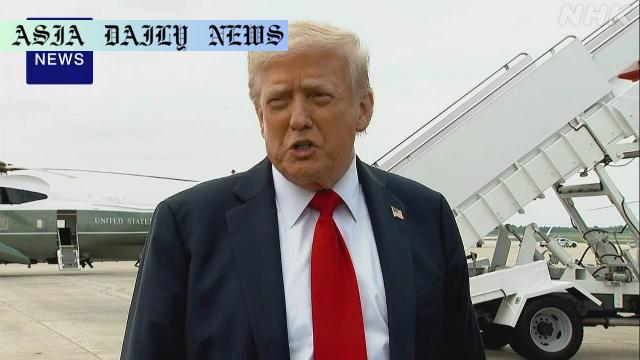Auto Trade: Trump criticized Japan’s resistance to expanding access for US automobiles, emphasizing unfair trade practices.
- US President Trump criticizes Japan’s unwillingness to open auto markets.
- Japan sells millions of cars to the US but resists importing US-made vehicles.
- Trump plans a 25% tariff on Japanese imports starting August 1.
- Negotiations are ongoing to bridge disagreements over tariffs and trade market access.

Trump’s Growing Frustration Over Auto Trade Imbalance
US President Donald Trump has once again expressed his dissatisfaction with the trade relationship between the United States and Japan, particularly concerning the auto industry. Speaking to reporters outside an Air Force base, Trump emphasized a longstanding grievance: Japan’s reluctance to open up its domestic market to American-made automobiles. He pointed out what he perceives as an imbalance, noting that Japan exports “millions and millions” of vehicles to the US annually, while making it difficult for US automakers to penetrate the Japanese market.
The debate over auto trade is not new. For decades, American automakers have faced challenges in breaking into Japan’s car market, citing non-tariff barriers, including complex environmental and safety regulations. Meanwhile, Japanese manufacturers have dominated the US market, offering affordable, high-quality vehicles that appeal to a broad base of American consumers. This dynamic has created a significant trade gap in the auto industry, which Trump has made a key focus of his trade policy agenda.
Proposed Tariffs and Their Implications
To address what he considers an unfair trade relationship, Trump announced plans to impose a 25% tariff on Japanese auto imports beginning August 1. The tariff is intended to pressure Japan into opening its markets and accepting more US-made goods, including not only vehicles but also agricultural products. However, such a move could have significant consequences. Japan is the fourth-largest exporter of automobiles to the US, and additional tariffs could disrupt supply chains, push up car prices, and strain relations between the two economic powerhouses.
Critics have questioned the effectiveness of such tariffs, arguing that they may harm American consumers and industries more than they benefit them. They also warn of potential retaliation from Japan, which could target US exports to its market. With trade negotiations ongoing, it remains to be seen whether the US and Japan can reach an agreement that satisfies both sides.
The Bigger Picture: Global Trade Dynamics
The US-Japan auto trade dispute is part of a broader effort by the Trump administration to renegotiate trade agreements and reduce deficits with major trading partners. Trump has taken a similarly aggressive approach with the European Union, China, and Mexico, demanding concessions and threatening tariffs to protect American industries. While these tactics have yielded some successes, such as the renegotiation of NAFTA into the USMCA, they have also sparked criticism and concerns about the long-term implications for global trade.
Experts note that while Trump’s focus on achieving reciprocal trade agreements is understandable, the methods employed may undermine trust and cooperation with key allies. Additionally, there is the risk that escalating trade tensions could lead to a global slowdown, as countries resort to protectionist measures to shield their economies.
Future Prospects for US-Japan Trade Relations
As negotiations between the US and Japan continue, attention is focused on whether both nations can find common ground. For Japan, opening its auto market further would likely require navigating domestic resistance and recalibrating its trade policies. For the US, balancing demands for market access with the need to maintain strong bilateral relations will be a challenging task.
The outcome of these negotiations could set a precedent for other trade agreements and influence the global economic landscape. Whether the two nations ultimately reach a mutually beneficial agreement, the discussions underscore the complexities and challenges of modern trade policy in an increasingly interconnected world.



Commentary
A New Era in Auto Trade?
President Trump’s push to renegotiate auto trade terms with Japan reflects broader challenges in the global trade system. By highlighting Japan’s significant automobile exports to the US, Trump has reignited a conversation about fairness and reciprocity in international trade. While his focus on protecting American jobs and industries resonates with many, it raises important questions about the potential costs of aggressive trade policies.
Unintended Consequences of Tariffs
One potential drawback of imposing high tariffs is the impact on American consumers. Imported Japanese vehicles are popular in the US for their affordability and reliability. Additional costs due to tariffs could make these cars less accessible, putting financial strain on buyers. Furthermore, retaliatory measures by Japan could affect US industries, particularly agriculture, given Japan’s role as a key market for American farmers.
Balancing Trade Policies with Diplomatic Relations
While Trump’s approach to trade negotiations has been bold and uncompromising, it underscores the need for a delicate balance. Strengthening domestic industries is a worthwhile goal, but it must be pursued without alienating long-standing allies like Japan. Positive trade relations serve as the foundation for broader alliances, and any disruption in economic cooperation could have ripple effects on security and geopolitical matters.
Looking Ahead
As the US and Japan continue to negotiate, there is hope that both nations will prioritize collaboration and compromise over conflict. A balanced resolution could pave the way for stronger economic ties and set an example for addressing similar trade disputes worldwide. Ultimately, the goal should be to create a trading environment that benefits all parties, fostering economic growth and stability on a global scale.